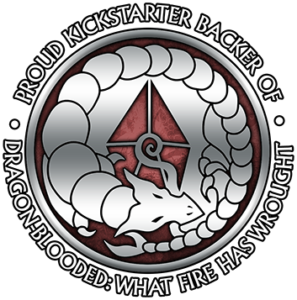In the morning, they returned to the site of the previous night’s ghosting. The grey light of the unseen face of the sun illuminated little in the glowering presence of Teinwood that the previous night had not revealed.
The grass in the area was the same as the green grass in all the land that had once been forest but was now plains. The only difference was a cleanness, perhaps, to the stems, and a lack of much scent, and to Caerdwyn’s percipience, a sensation like green liquor poured into the earth, and lingering.
Whatever dark shapes felled horse and rider, and whatever message their spirits may have meant to impart, there was nothing more there in the earth. Only more questions, of which already they had their fill. The goat seemed to watch them, anxiously, from her pen, silent until they gathered their things and left, the 3 carved figures in their pockets.
After a long day’s walk with the ghost of Teinwood always west, emerging and disappearing with the tides of the mist, they came upon the town of Dun Vwym. A modest town gathered on a small peninsula of land in the embrasure of a river.
They crossed a Builder bridge – long and slender and impossibly arched over the black water running out of the Pynwydden. They took to the narrow, damp-looking arch. The footing was solid and slipless. The passage was simple, elegant. The black water slid innocently by underneath, but it did not seem as though it needed to be so.
They took up some reprovisioning in the little town, and went largely unnoticed by its populace, even with the two inhumans in their midst.
After some eavesdropping and ease in a tavern, they took to the small road that led east, into a thick pine wood, up into the brasure of the mountains.
After some travel, they came upon a sound that slowed them, but gave their hearts cause to hurry and to search. At first, it was a harp that seemed to be plucking the reason for the surcease of stones from the air. The violin that overtook it – albeit momentarily – was the sound of water on stones, carving a new path. And then a man’s tenor rose over both, and the violin died, and the harp took on a strident cadence to soothe the spirit, and the voice rose toward the unchecked vaults of Jyn’s heaven.
They came upon harper and violinist/singer in a glade thick with pine needles and the scent of eternal life.
The spoke briefly to the two apprentices (Durdd and Siannic) from Tuhál and Arddbyn respectively. They seemed nonplussed by the arrival of the unlikely strangers, and agreed to lead the group up to the abbey.
The great stone edifice of Pynwydden Abbey greeted them as they came, seeming to loom high and grander with each switchback of the road. With such an approach, Bayeo knew that no small army would take such a place.
They departed company with the apprentices and turned to appreciate the wide swath of the hill – the contrasting stone fields and the thick highland bog where the goats dwelt in a goaty approximation of peace.
A tall woman, the Abbess Gwyn, met them at the door in a simple shift of pure white. She invited them inside, into an audience room where many fine men and women were gathered, singing and playing and talking in the presence of a tree-consuming fireplace that blazed the building with incipient heat, and seemed to say to the eternal chill of Tuhál’s mountains: your place is there, and this is for something else.
She inquired, politely, as to the reason for their visit. Caerdwyn briefly outlined their tale.
A cry, at the mention of the death of Arric and his companions, arose from one of the bards present (later identified as Vodaan, Ciamhain’s old master). He wailed a long moment, and tore at his clothes, limned by fire. His voice shook and silenced those present.
He gathered himself, and when he rose and looked up, his eyes were red-rimmed. He leveled a gaze and an incredible presence at them. “Who is responsible for this?”
A silence was upon them. Caerdwyn looked at Saar, who shrank down from his seven foot height.
“It is not a person, I am afraid,” the Questioner found himself saying, “but rather a being, a servant of the Serpent, apparently, called the Mistlord.”
Vodaan’s gaze narrowed, and he made a terrible sound and stalked from the room.

 RSS - Posts
RSS - Posts
Ah… the elegant bards, and noble Pynwydden Abbey. One of the lone sanctuaries in their quest, though it seemed little enough comfort was had there.
I think Caerdwyn enjoyed the works of the bards and the Abbey, but found a melancholy in them as well. For all their beauty and songs and art, there was a rigidness about them, like they were just as trapped and sterilized by their traditions as the cold-shouldered Skyhouse.
Then there was Vodaan. A soul so troubled that it would seem wiser to keep him close at hand than not. Caerdwyn pitied him more than hated him, but saw no friendship between them.